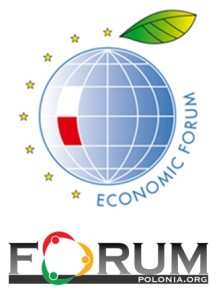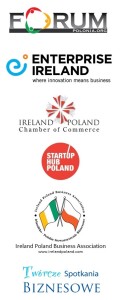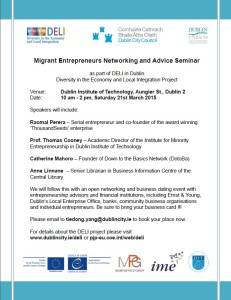Are you a Polish entrepreneur working in Ireland? Perhaps you are planning to start your own business? Or maybe you wish to change the profile of your company and start something new?
The Polbusiness training is what you are looking for!

The Foundation Institute for Eastern Studies based in Warsaw, Forum Polonia and other partners invite you to participate in a 3-day long training course on doing business in the Republic of Ireland. The series of training seminars aims to support the functioning of your company in the receiving country, as well as facilitate contacts with potential business partners and institutions in Poland. The trainings will be conducted by Irish experts as well as the Polish partners of the project. Each session will be devoted to a different issue: from basic legal regulations, to industry secrets and alternative business patterns. The trainings will take on different forms: analyzing case studies, workshops, competency tests. A more detailed programme is provided below.
In order to participate in the training please fill in the registration form which is available on the following website: http://www.forum-ekonomiczne.pl/polbusiness/
The training will take place on 11-13 June 2015 in Dublin. You can apply until 29th May.
The Polbusiness project is co-financed by the Department of Public and Cultural Diplomacy of the Ministry of Foreign Affairs within the framework of a competition “Cooperation in the field of public diplomacy 2015”
Programme
The sessions of the training will evolve around the following themes (8):
Day 1
- Basic legal regulations, legal and financial assistance in starting a business (4h)
At the beginning of the seminar the participants will familiarize themselves with the British/Irish law that regulates the basic aspects of running a business. They will learn about the opportunities and obligations that result from the legal requirements. Furthermore, they will be informed about the potential tax advantages as well as legal and financial assistance opportunities they can benefit from. They will also learn where and how to apply for such assistance.
- Business culture in the United Kingdom/Ireland (4h)
The following issues will be discussed during this part of the training:
- the reasons for organising cultural trainings in companies
- characteristics of the country – United Kingdom/Ireland
- the most important aspects of British/Irish culture
- British/Irish business etiquette
Day 2
- Retail and sales (4h)
This part of the training will focus on effective sales strategies, including the following points:
- Professionalism in retail
- Creating the image of a competent consultant
- First contact and sales pitch
- Sales conversation
- Identification – customer personality types
- IT and new technologies (4h)
Information technologies play a very important role in modern businesses, as they are present in virtually every aspect of their functioning. This fact is proved, for instance, by the investments in IT, which often take up more than a half of the investment budget in many enterprises. At the same time, very often they do not bring the expected results. That is why such investments need to be systematized in order to maximize the value of the enterprise. The participants of the training will learn about the concept of IT Governance, which encompasses the following: strategic alignment, value delivery, resource management, performance management and risk management. Thanks to applying IT Governance a business is can use the data it has in the most effective way and maximize the gains that come from them.
Day 3
- Media and culture and alternative business (4h)
The training aims to consolidate and extend the knowledge about the new media, together with presenting the newest trends, innovations and tools of internet communication.
Among others, the following themes will be touched upon during the training:
- Internet portal
- Serach engine and positioning
- Internet commercials
- Social media
- Blogosphere
- Managing internet communication
In the second part of the session the participants will learn:
- How to expand their business in an honest and ethical way.
- How to become a perfect salesperson/networker.
- How to create a dynamic, powerful MLM structure.
- How to make a great global MLM business.
- How to motivate and not manipulate their co-workers.
- International Trade and Cooperation with business institutions in Poland (4h)
The participants taking part in this seminar will obtain complex knowledge and skills pertaining to launching, as well as running sales on new, attractive foreign markets. They will be able to answer the following questions: how to choose the right destinations, build the right strategy, effectively promote and sell products on foreign markets, successfully negotiate and secure trade contracts.
The Project participants will obtain knowledge about the possibilities and benefits from maintaining contact, as well as partnership with business institutions in Poland. The models and examples of launching such cooperation, together with basic, practical information pertaining to effective partnership proceedings will be presented during the training.
The seminar leaders will contribute to the creation of a report covering all the seminar sessions from the programme. This report will then be presented during the Economic Forum in Krynica-Zdrój in September 2015 and the Congress of Polish Entrepreneurs in London in October 2015.
Partners of the Project

Migrant Entrepreneurs Networking and Advice Seminar takes place on Saturday 21st March 2015 10 am – 2 pm in Dublin Institute of Technology Aungier. St.
Office for Integration, Dublin City Council, http://dublincity.ie/deli

The first annual conference for Polish teachers working at Polish schools in Ireland will take place at the Humanities Institute of Ireland, University College Dublin on Saturday, November 19th, 2011.
At a time when the Department of Education and Skills in Ireland is striving to improve and increase literacy levels in Irish schools, migrant-led schools play a very important support role in this work.
There are 12 Polish schools in Ireland which operate under the remit of the Polish Department of Education and which cater for over 4,000 Polish children living in Ireland. The work of these migrant-led schools is undeniably essential in the area of first language maintenance, which is important for educational, cognitive, as well as social and economic reasons.
With an estimated Polish population in Ireland of 200,000 (Census 2006 recorded 5,900 children aged 0-19) and no significant impact of the recession on return figures (by the end of 2008, the only decreases recorded by Poland’s CSO in the number of Poles registered abroad were in Britain (decrease of 40,000) and Ireland (decrease of 20,000)), this conference is both timely and welcome.
Over 50 delegates, including teachers and parents from all the Polish schools in Ireland, are expected to attend. The programme includes a number of informative and practical workshops, as well as a forum for discussion on work at Polish schools in Ireland and elsewhere.
Keynote speakers include experts from the Ministry of Education in Poland and ORPEG (the agency responsible for training Polish teachers who work abroad). Also attending will be the Chairperson of the Network of Polish Schools in Britain (Polska Macierz Szkolna), Ms. Aleksandra Podhorodecka, who will kickstart a discussion on the creation of a similar network in Ireland. Representatives from the Education for Democracy Foundation and the MyMind Psychological Centre will also deliver presentations.
The conference has been made possible through the support of Wspólnota Polska, the Polish Embassy in Ireland, the Irish Polish Society, and Forum Polonia.
Additional information:
· The Polish schools in Ireland operate at the weekend. On Saturdays and Sundays, pupils follow the Polish school curriculum in Polish (language), history, geography and maths. Five of the twelve Polish schools are (Polish) State-funded, while the remaining seven are privately funded. The five State-funded schools cater for approximately 3,000 pupils; the seven privately-funded schools cater for over 1,000 pupils.
· At present, approximately 10% of primary school pupils and 12% of post-primary school students were born outside of Ireland. In schools, there are pupils from over 160 countries and over 200 languages are spoken. For approximately 70-75%, English is not their first language (Source: Department of Education and Skills 2010, Better Literacy and Numeracy for Young People. A Draft National Plan to Improve Literacy and Numeracy in Schools, p. 35).
· There exists a substantial body of international research evidence in support of maintaining and developing first language proficiency among minority language children. These data particularly point to the positive benefits of first language proficiency on the development of the second language (i.e., in this case, English and/or Irish). The well-known academic Professor Jim Cummins has articulated this as the ‘developmental interdependence’ hypothesis (1979).
· Migrant-led schools are a vital link in the development and maintenance of the first language. Only on rare occasions do Irish mainstream schools provide classes in the first language for their pupils. This is mainly a school-based initiative. The school is not obliged to provide first language classes for pupils whose first language is not English.
· The maintenance of the first language is also important for the maintenance and development of intergenerational relationships, friendships at home, as well as for community solidarity, social capital and cohesion purposes. In cases where families decide to remain in Ireland more permanently, it is equally as important to maintain the first language because of the educational and familial benefits to the individual as well as to society as a whole.
For more information contact:
Name: Niamh Nestor. Beata Molendowska
Tel.: 086 3961430 (Niamh), 087 6707837 (Beata)
Email: niamh.nestor@ucdconnect.ie, niamh.nestor@gmail.com, “Beata Molendowska” <beata.molendowska@gmail.com>,
Photos will be available after event.
 EPIC (Employment for People from Immigrant Communities) is a FREE1 programme open to all adults
EPIC (Employment for People from Immigrant Communities) is a FREE1 programme open to all adults
from EU states entitled to work in Ireland and those from non-EU states with stamp 4.
EPIC’s multicultural team assists this target group to find employment and/or further training and
education in Ireland.
What EPIC provides for clients:
• Pre Employment Training (3 weeks) – for specific use in job interviews and in the workplace environment, including interview skills, telephone skills, CV and cover letter writing techniques.
• Living and Working in Ireland Training (3 weeks) – includes a full week of intensive interview preparation, IT skills training, and a variety of information sessions covering such topics as employment rights, social welfare to work and access to education and healthcare.
• Career guidance & assistance applying for jobs and training. Each client works individually with a Training and Employment Officer (TEO) to help them find the work or training they need. This includes help with CV preparation, psychometric testing & coaching for interviews.
• Social Support – advice on Social Welfare, housing, family and other issues.
• Mentoring service available.
• Advice for entrepreneurs.
• Free access to computers for online job searching.
• Certificate of Participation upon completion of the Training.
Applicants need an intermediate or higher level of English in order to take part in the course.
For more information on the programme please contact the EPIC team:-
EPIC Programme, 30/31 Lower O’Connell Street, Dublin 1 (opposite the GPO)
Telephone:01 874 3840 and 01 874 3841
E-mail:epic@bitc.ie
During last year a total of 255 persons engaged in the Programme. 205 clients completed our six weeks Pre-employment and English for Work training and another 50 accessed our personalised services. We placed 187 in employment, education or volunteering positions and also provided individual psychosocial support to 91 clients. Our training and personalised services provided the participants with the necessary knowledge and skills to succeed in the work and education environment in Ireland and also increased their understanding of the Irish system and their social integration. Our placement rate for 2010 was 73%. We are delighted by these results and have been improving the quality of our services to continue supporting our target group during this year.
Our trainings start every three weeks and we have a new one beginning on Monday June 13th. We would appreciate if you can share our information with your colleagues. Please contact me at 01 8743842 if you have any questions or concerns about the EPIC Programme.
What is the seminar about…?
The European Anti Poverty Network Ireland, with the support of the Department of Foreign Affairs, will hold a lunchtime resource seminar on Tuesday February 8th 2011 on applying for EU funding opportunities. Many community and voluntary groups have expressed concern about the difficulties of understanding and availing of sometimes complex EU funding systems. This seminar is aimed at those individuals and groups. Speakers will recommend – from their own expert experience – strategies for engaging with EU funding, how to research and submit funding applications and influence EU policy-making.
Agenda…?
11.15am: Registration
11.30am: Opening Remarks and Context of the Event / Anna Visser
11.40am: Direct Funding Opportunities from the EU / Ronan Gingles
12.00pm: Interreg Programmes / Antoinette Jordan
12.20pm: Personal Account of Making Funding Applications
12.30pm: Group Discussions
12.50pm: Questions and Answers
1.30pm: Lunch
Who is welcome…?
Anyone with an interest in applying for EU funding opportunities is more than welcome to attend the event.
Where is it…?
Wynn’s Hotel, 35-39 Lower Abbey Street, Dublin 1.
How to attend…?
Please send your contact details to aine@eapn.ie before Friday the 4th of February if you would like to attend this event.
A small bursary may be available to support participation in this seminar.





 EPIC (Employment for People from Immigrant Communities) is a FREE1 programme open to all adults
EPIC (Employment for People from Immigrant Communities) is a FREE1 programme open to all adults